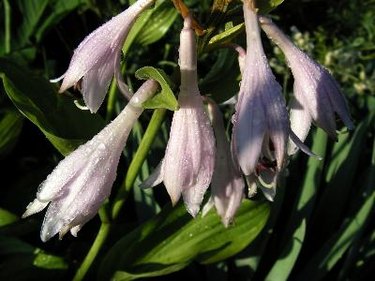
While hostas are usually grown for their impressive foliage, all varieties also produce flowers atop tall stalks. The flower stems must eventually be trimmed from the plant to keep it healthy and attractive. When you decide to trim depends on the hosta variety and your personal preference on the plant's appearance.
Early Removal
Video of the Day
Not all hostas produce attractive flowers. Many plants are grown instead for their large, colorful leaves. Hosta leaves usually feature color variegations, including shades of green, yellow, white and pink. The small flowers detract from the foliage display. It also takes energy to produce flowers, which diverts nutrients and energy from foliage production. Remove the flower stalks as they begin to form but before the flower buds open in late spring and early summer. Cut the stalks at their base, removing them completely from the plant.
Video of the Day
Late Removal
Many hostas, especially the more modern hybrids, produce tall spikes of impressive flowers. While the foliage of these plants is as attractive as that of the varieties with inconsequential flowers, the flowers are also prized. Flower color depends on the type of hosta, but most types produce white or cream flowers, but you can also find pink and purple flower varieties. If you prefer to enjoy the blooms, remove the flower stalks after the last of the flowers begins to wilt.
Other Necessary Pruning
Hostas require very little additional pruning beyond flower stalk removal. Cut out any leaves that yellow or die back during the summer, removing them where they emerge from the main part of the plant. Hail- and weather-damaged leaves must be removed promptly, especially if they are torn. Damaged foliage provides an entrance for pests and diseases that can kill the hosta. Hostas don't require any pruning to maintain their shape or size.
Setting Seed
It can be tempting to allow your hosta to set seed by leaving the old flower stalk to remain if you would like to propagate more plants. Most modern hostas are hybrids, so the seed formed will not produce a plant identical to the mother plant. Seed may not even be viable. Hostas are rarely grown from seed for these reasons and instead are propagated through root division. Allowing the plant to set seed instead of pruning away the flower stalk weakens the hosta, as energy and nutrients are diverted from the plant to the developing seeds instead.